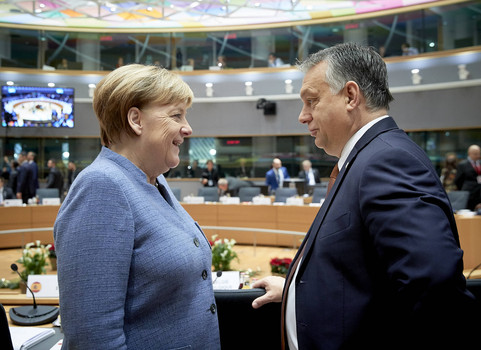[ad_1]

The agreement reached at the European summit on the EU’s contested rule-of-law conditionality regulation put an end to the Hungarian-Polish blockade of the EU’s historic €1.8 trillion budget deal.
The deal is not only a Christmas gift for those, mostly southern European, governments that have been desperately waiting for a fast access to the EU’s coronavirus recovery funds, but also for the German Council presidency and chancellor Angela Merkel.
The reputation of German EU diplomacy and Merkel’s political legacy were both at stake: the first was threatened by a potential prolongation of the veto, while the second by a further appeasement of Europe’s wannabe autocrats, Hungarian prime minister Viktor Orbán and Poland’s Jaroslaw Kaczynski.
Since November, the Polish and Hungarian blockade obviously changed the political mood throughout Europe.
The block of the EU-25 remained surprisingly solid, while the determined position of the Netherlands, the Nordic countries, and the European Parliament pushed Berlin to give up its original conciliatory approach toward Warsaw and Budapest.
This political shift, as well as the credible threat posture posed by a potential inter-governmental corona recovery package excluding Poland and Hungary, and the internal clashes in the Polish governing coalition resulted Tuesday in the de facto withdrawal of the two defeated illiberal governments.
Their main goal was either to get rid of the rule of law conditionality mechanism or to water it down significantly, but they failed spectacularly.
Thursday night’s deal just put the icing on the cake, allowing Orbán and Morawiecki a retreat without losing face in the domestic arena.
The summit conclusion largely refrained from offering any substantial concessions to Poland or Hungary. The draft regulation will not be renegotiated. It will be passed in the council and the parliament immediately, together with the other outstanding parts of the budget deal.
Practically, the EU leaders merely delay the application of the rule-of-law conditionality regulation and slightly narrowed down its scope.
According to the language, the European Commission will develop and adopt a set of guidelines that will specify and elucidate the rules of the mechanism. However, as long as the guidelines are not published, the Commission will refrain from proposing any measures under the regulation.
Furthermore, if any member state decides to file an action for annulment request against the rule of conditionality mechanism before the Court of Justice of the European Union, the finalisation of the guidelines will be postponed until the European Court of Justice decides whether the regulation is in line with European law.
Poland and Hungary will both file such a lawsuit for sure, and with an eye on the ordinary lengths of ECJ procedures, this may result in further one or two unmolested years for Orbán and Kaczynski, covering the period until Hungary’s next general election in 2022.
Except if one of the defendants in the case (the co-legislator European Parliament or a potentially intervening European Commission) decides to request an expedited procedure.
If the ECJ approves the request, the concerns related to the suspension of the mechanism can be largely sorted out.
Although the language of the conclusion is largely restrictive, it does not imply anything that would have not been already stated in the text of the regulation.
Obviously, EU leaders put a heavy political pressure on the commission to follow this restrictive approach if the guardian of the treaties wishes to summon the qualified majority in the council necessary to sanction deviating member states.
According to the leaders’ interpretation, breaches of the rule of law can only be sanctioned if the impact on the EU’s financial interest is sufficiently direct and duly established, which is largely in line with the regulation’s text.
Polish and Hungarian media leaked that alleged references to the mechanism’s non-application in case of sexual minorities and migration related issues may also be part of the conclusion, but this scenario ultimately failed to materialise.
It would have been a huge political gift for the Polish and Hungarian governments, which could have exploited it for domestic consumption – but that embarrassment was duly avoided.
Overall, it is fair to say that the threat posture posed by the intergovernmental corona recovery package worked fabulously, bending the Polish and Hungarian governments much sooner than anyone has realistically expected.
It is an inevitable lesson for all EU member states and institutions that they need to build up proper hard political and economic leverage when facing the challenge posed by autocratising member states, such as Hungary or Poland.
Considering the trade-off between time, the urgent need to get access to the corona recovery funds, and substance, the deal represents a fairly well balanced, realist compromise much likely everyone can live with.
Although there will be critical voices from the European Parliament, no one can really consider blocking the budget package further. The deal is simply too good to do that.
Orbán and Morawiecki missed a gift
Although the deal is much more a result of the unswerving positions of the Netherlands and the European Parliament than of the German presidency’s negotiation skills, the success is an extremely important face-saving measure for Berlin.
The start of the presidency was largely overshadowed by the inexplicably soft council presidency proposal on the rule-of-law conditionality mechanism that largely favoured Poland and Hungary.
It was a strategic failure by Orbán and Morawiecki that they refused that language.
Now, they leave the playing field with much smaller gains.
However, the presidency proposal raised the suspicion that Merkel is ready to please the central and eastern Europeans in the rule of law debate, practically whatever it costs.
The deal will not nullify Merkel’s decade-long support for Orbán.
Due to her Hungary-policy she shares considerable responsibility in the EU’s recent institutional crisis. However, her political legacy won’t be tarnished by a final great act of appeasing EU-autocrats.
Ironically enough, it happened under the German council presidency that EU member states first time stood up together and drew the line for Merkel’s pet autocrat.
[ad_2]
Source link